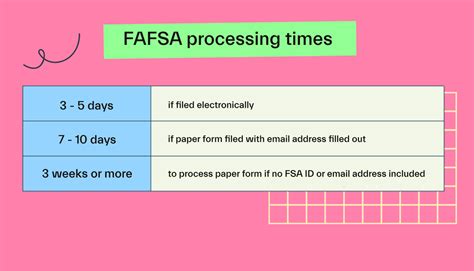Applying for financial aid can be a daunting task, especially when you’re waiting to hear back from the Free Application for Federal Student Aid (FAFSA). The FAFSA is the primary form used to determine your eligibility for federal student loans, grants, and work-study programs. So, how long does it take to hear back from FAFSA?

Timeline for FAFSA Processing
The FAFSA processing timeline can vary depending on when you submit your application. Generally, you can expect to receive a response within the following timeframes:
1. Filing by March 1st
- Your FAFSA is processed within 2-3 weeks.
- You receive your Student Aid Report (SAR) about 10 days after processing.
- Your financial aid award letter is sent by your college or university within 6-8 weeks.
2. Filing after March 1st
- Your FAFSA is processed within 4-6 weeks.
- You receive your SAR about 10 days after processing.
- Your financial aid award letter is sent by your college or university within 8-10 weeks.
Factors Affecting FAFSA Processing Time
Several factors can affect the FAFSA processing time, including:
- Volume of applications: The number of FAFSA applications received by the government can impact processing times.
- Errors or missing information: If there are any errors or missing information on your FAFSA, it may take longer to process.
- Review for verification: In some cases, FAFSA applications are selected for verification, which can extend processing time.
How to Check the Status of Your FAFSA
You can check the status of your FAFSA online by visiting the Federal Student Aid website (https://studentaid.gov/). Create an FSA ID if you don’t have one. Once you log in, you can view your application status, including:
- Whether your FAFSA has been received
- If there are any errors or missing information
- The date your FAFSA was processed
- The date your financial aid award letter was sent
Tips for Expediting FAFSA Processing
To expedite the processing of your FAFSA, consider the following tips:
- File your FAFSA as early as possible, preferably by the March 1st deadline.
- Accurately and completely fill out your FAFSA.
- Include all required documentation, such as your tax returns.
- Sign and submit your FAFSA electronically using the electronic signature option.
- If you are selected for verification, respond promptly to the request for additional documentation.
Importance of Timely FAFSA Submission
Submitting your FAFSA on time is crucial for several reasons:
- Early award notification: You’ll receive your financial aid award letter sooner, giving you more time to plan for college expenses.
- Increased eligibility: Filing early increases your chances of being eligible for need-based financial aid, as funds are limited.
- Avoiding late fees: Some colleges charge late fees for students who do not submit their FAFSA by the deadline.
Conclusion
The time it takes to hear back from FAFSA can vary, but generally, you can expect a response within 2-3 weeks if you file by March 1st or 4-6 weeks if you file after March 1st. By following the tips outlined above, you can expedite the FAFSA processing time and increase your chances of receiving financial aid for college.
Additional Resources:
- Federal Student Aid Website
- How to Check the Status of Your FAFSA
- Tips for Expediting FAFSA Processing
Frequently Asked Questions (FAQs)
Q: How long does it take to receive my financial aid award letter?
A: After your FAFSA is processed, your college or university will send you your financial aid award letter within 6-8 weeks (March 1st filers) or 8-10 weeks (post-March 1st filers).
Q: Do I need to submit my FAFSA every year?
A: Yes, you need to submit a new FAFSA every year you plan to attend college or career school.
Q: What happens if I miss the FAFSA deadline?
A: If you miss the FAFSA deadline, you may still be eligible for some federal student aid, but your award amount may be reduced. Contact your college or university’s financial aid office for more information.
